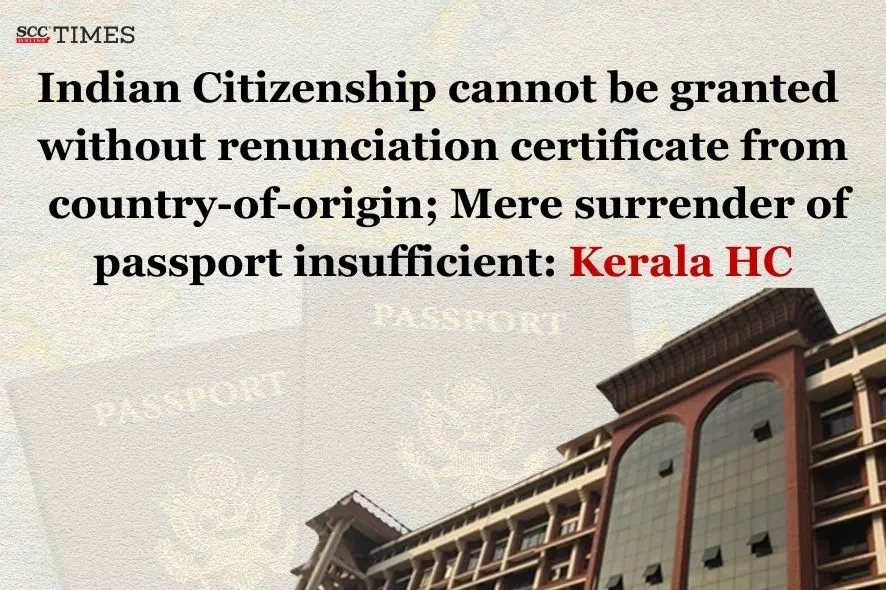Kerala High Court: In an intra-court appeal filed by the Union of India under Section 5 of the Kerala High Court Act, 1958, challenging the judgment dated 23-07-2024, whereby the Single Judge had directed that two Pakistani minors (respondent 2 and 3) be granted Indian citizenship without insisting on a Renunciation Certificate, the Division Bench of Sushrut Arvind Dharmadhikari* and Syam Kumar V.M., JJ. held that Indian citizenship cannot be granted to a foreign national merely based on surrendering a passport issued by their country of origin. The Court reiterated that the production of a valid Renunciation Certificate is a mandatory requirement under Indian law for renouncing foreign citizenship, and its absence bars the grant of Indian citizenship.
Background
Respondent 1 is the mother of respondent 2 and 3. Her husband, was born in Kottayam-Malabar village in Kannur District, India. After becoming an orphan at the age of nine, he was adopted by his grandmother and migrated to Pakistan with her in 1977, where he was later issued a Pakistani passport. He is currently employed in the United Arab Emirates. He married Respondent 1, who is his uncle’s daughter. In 2008, the family moved to India with the Indian Government’s permission, which was initially granted for a limited period and subsequently extended.
Respondent 1 to 3 submitted applications in Form VI under Rule 8(1)(a) of the Citizenship Rules, 2009, seeking registration as Indian citizens under Section 5(1)(f) of the Citizenship Act, 1955. The Union of India issued orders stating that the Government of India had decided to grant citizenship to respondent 2 and 3, subject to certain conditions, including submission of a Renunciation Certificate issued by the Pakistani Government. Since the certificate was not submitted, the grant of Indian citizenship was withheld.
Aggrieved, Respondent 1 to 3 filed a writ petition seeking consideration of representation and a direction to grant Indian citizenship to respondent 2 and 3 without insisting on the Renunciation Certificate.
Analysis and Decision
The Court emphasised that to acquire Indian citizenship, an individual must fulfill the conditions laid down in the Citizenship Act, 1955, which does not permit dual citizenship. A person, whether a major or minor, must renounce their existing foreign citizenship before being granted Indian citizenship. In this case, respondent 2 and 3 admittedly remain citizens of Pakistan, as they have not formally renounced their Pakistani citizenship in accordance with Section 14A of the Pakistan Citizenship Act, 1951.
The Court stressed that the requirement of a Renunciation Certificate issued by the Pakistani Government is a mandatory legal prerequisite. Mere submission of alternative documents does not satisfy this statutory requirement. Therefore, unless the respondents produce the Renunciation Certificate, they cannot be recognised as Indian citizens.
In view of the above, the Court concluded that respondent 2 and 3 cannot be declared Indian citizens without proper compliance with the renunciation process. Consequently, the judgment dated 23-07-2024 passed by the Single Judge was set aside, and the writ appeal was allowed.
However, the Court clarified that this decision will not preclude the authorities from reconsidering the case of respondent 1 to 3 if they fulfill all statutory requirements.
[Union of India v. Rasheeda Bano, 2025 SCC OnLine Ker 6512, decided on 23-08-2025]
*Judgment Authored by: Justice Sushrut Arvind Dharmadhikari
Advocates who appeared in this case:
For Appellant: Mini Gopinath, Senior Panel Counsel
For Respondent: M.Sasindran, Sunil Kumar Kuriakose, GP


